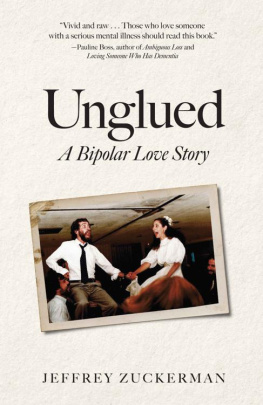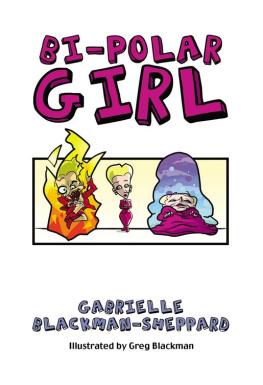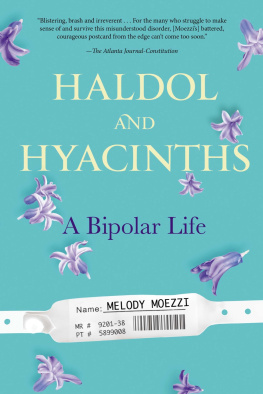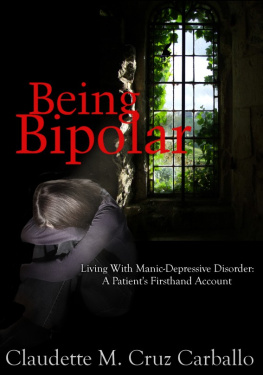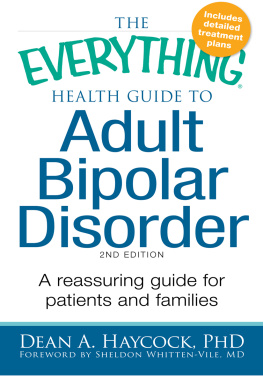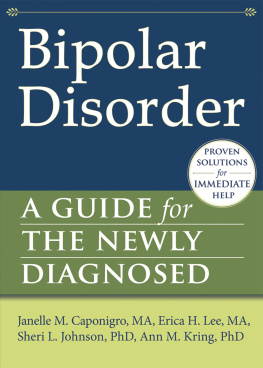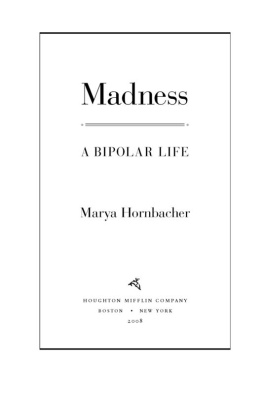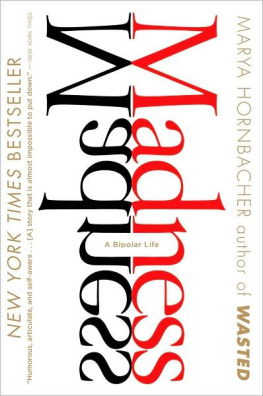

AUTHORS NOTE
By providing candid details about my experience, I attempted to combat the stigma of mental illness and discrimination against those who have such an illness. By request, I changed several names and two locations.
Book Design and Production
Boyle & Dalton
www.BoyleandDalton.com
Cover photo provided by the author
Copyright 2020 by Jeffrey Zuckerman
All rights reserved
This work is the intellectual property of the author.
Your cooperation with and support for U.S. copyright law is appreciated.
LCCN: 2018956680
Paperback ISBN: 978-1-63337-376-1
E-book ISBN: 978-1-63337-378-5
Printed in the United States of America
1 3 5 7 9 10 8 6 4 2
For my family
Contents
T he January blues are hardly uncommon in the Upper Midwest, where my wife Leah and I have frozen like human Popsicles for nearly four decades. Over the years, the weight of wintertime was particularly punishing to Leah. Her doctors suggested she might be struggling with seasonal affective disorder, and to lighten her load they prescribed the antidepressant Prozac. For a long time that helped well enough, along with one of those million-watt therapy light boxes, like the kind used as lighthouse beacons or along the top of prison fences.
Frigid winters notwithstanding, we loved raising our two kids in Minnesota. Leah flourished in long careers in social work and public health, and each spring she emerged from hibernation with gusto. She cultivated a big backyard flower garden and set bouquets of lilacs and peonies atop the dining room table. Most years I worked two jobs to help make ends meet. Each summer I played softball and Leah entertained our friends with well-executed dinners on our deck. She and I eventually made enough money to take a few memorable trips, and off to college went our adult children.
In 2015, our marriage was sucked into a whirlpool.
In May, a turbulent weekend in New York City and Leahs tumultuous trip to the Middle East.
In June, full-on mania.
In July, her uncorked rage.
In August, a diagnosis of bipolar disorder.
In September, Leahs first hospitalization.
In late October, her first Great Depression, six months spent in the blackness of our bedroom under a blanket of melancholy and inertia.
In 2016, second verse, same as the first.
As Leahs life became unmoored by a late-onset mood disorder, I became unglued. I was terrified of her manic episodes and demoralized by her depression. I read unsettling advice about how to talk to someone who rejects his or her diagnosis, as well as a dispiriting set of essays by authors mired in depression. I listened to TED Talks and podcasts and watched videos on YouTube. I attended support groups and wrote in a journal and talked to clergy and read powerful memoirs written by men and women with mental illnesses, people not much different from Leah.
The spouses in those narratives were portrayed either as angels or as bit players in their husbands and wives dramaswhich belied my experience. In my support groups, those of us who loved someone with a mental illness saw ourselves as neither heroic nor righteous. We bumbled along, day after day, month after month, often crushed by the weight of the stress and moral incertitude in our own roles as caregivers.
One night a husband in my group summed up his twenty-year marriage: I have a lovehate relationship with my wifes bipolar disorder, he joked. I love my wife, and I hate her bipolar disorder.
I laughed. It was funny, and it was honest.
And it was the book I most wanted to read. A story in which the spouse, like that guy in my support group, is top banana in a real-life tragicomedy. A morality play that captures the day-to-day and year-to-year struggle to maintain ones sense of humor, integrity, and emotional and physical health in the face of a friend or family members harrowing chronic illness.
A story of resilience, and a story of hope.
This story: a memoir of enduring love.
CHAPTER 1
L ook, we werent Jay Gatsby, with vast blue gardens and men and women coming and going like moths among the champagne and stars. Leah and I were two middle-class Midwesterners who in the winter shoveled snow and in the summer grilled salmon burgers over charcoal briquettes. We set plastic lawn chairs under the shade of a silver maple, and every ten years we invited a few dozen friends to our backyard for a Sunday afternoon bash to celebrate our health and good fortune.
The last such gathering was in September 2014, coming up on my sixtieth birthday and our thirtieth wedding anniversary. Our kids flew inSarah from New York and Joey from Portland. I mowed our patch of grass and hosed the dirt off the deck. There was white wine and cold beer and plates of finger foods and party dips assembled by Leah and Sarah. There was the sound of an electric piano on which Joey played jazz and the aromas and sights of late summer, citronella candles and hydrangeas, impatiens and purple Russian sage.
There was Leah, calm and content, with her chocolate eyes and broad smile and long brown hair with tints of red. There were neighbors and laughs and a fading sun in an orange and lavender sky. And before our guests departed, I passed around an old bowling pin for our friends to sign, and I offered a farewell toast, with Leahs hand folded in mine.
Thank you all so much for your friendship and love, I announced in the September twilight. Leah and I want to invite you back here in ten years to celebrate our fortieth anniversary and my seventieth birthday. We hope these will be the best years yet in all our lives.
How charming.
And after what Leah and I endured during the next five years, how thoroughly naive.
MAY 2015, EIGHT MONTHS LATER, a springtime Sunday in Brooklyn, New York. Sarah and her fianc Seth, their dog, and I were sprawled on their sectional, waiting for the other guests to arrive, yawning our way through a recorded episode of Jeopardy! Their apartment was small and dark and the toilet seat was broken, but they had a walkout to the backyard where their dog did his business and where Seth would barbeque a big lunch later that afternoon.
Famous Quotes for one thousand dollars, Alex Trebek read. Today I feel like the luckiest man on the face of the earth.
Who was Lou Gehrig? Seth shouted.
Sarah, give Seth a thousand dollars.
Daddy, who was Lou Gehrig?
The first guy with ALS! Seth practically screamed. Sarah, he was, like, one of the all-time great New York Yankees. You ever hear of Babe Ruth?
In two months my Midwestern daughter would be marrying this unrestrained New Yorker, as exuberant and opinionated as the city he held dear. He wore size 14 shoes, had a heart the size of a moose, and could make a cadaver laugh. I adored the guy, and, best of all, he and Sarah had fallen in love.
Fast-forward through a commercial for Ex-Lax. A promo for yesterdays newscast.
A father visiting Brooklyn, embracing a moment of joy with his soon-to-be-married daughter and her beau.
Pause the TV for a second, would ya? I drove all the way from Minnesota to tell you two something.
Whats that, Jeffrey?
Today... I feel... like the luckiest man on the face of the earth.
Thats so sweet, Daddy.
But Im Jewish, I said, so I know my luck will run out.
It was supposed to have been a joke.
WHERE WAS LEAH?
I had driven in to Brooklyn from Minneapolis on the first leg of a sentimental journey through the Midwest, and she had flown in to join me. We were there to attend Sarah and Seths engagement blessing that weekend at a Long Island synagogue. On Monday I would head back home on a three-day excursion through my home state of Pennsylvania. Leah had a flight to catch from Newark to Israel, with a layover in Belgium, to enjoy a few days of sightseeing. From Tel Aviv she would travel to Tunisia to volunteer for a couple of weeks with an international aid organization doing some kind of public health work I didnt quite understand.
Next page
